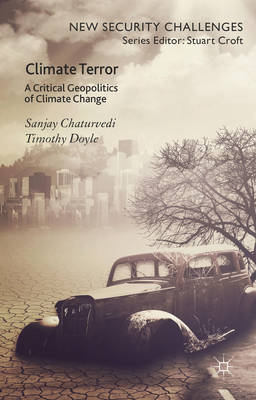New Security Challenges
1 total work
Climate Terror investigates the highly differentiated geographical politics of global warming. It explores how fear-inducing climate change discourses could result in new forms of dependencies, domination and militarized 'climate security'. In this revealing study from Chaturvedi and Doyle, the concept of environmental security is brought to life through cases of the most pressing environmental issues confronting the Global South, which are creating desperate realities for billions of people. The book proposes the following key questions, crucial to our understanding of this issue: Can the climate discourse be re-configured to provide a place where issues of environmental justice and sovereignty are paramount, rather than neo-liberal responses to climate? Can climate change give a voice to the global periphery, and can it be used as a vehicle for emancipation? Chaturvedi and Doyle's study concludes by taking note of the more optimistic response of 'emancipatory' groups and networks to concepts such as climate justice and climate debt, and the ways in which these groups have attempted to use this global climate moment for more democratic purposes.
Is the climate story, regardless of its diverse intentions, a discourse now captured by the affluent North to control the development of the Global South? Has the emancipatory moment now passed or is there still hope for the re-emergence of subaltern perspectives on climate futures? The authors further discuss the deployment of terror vocabulary to address climate change, which is a part of refurbished designs and technologies of control, regulation and domination in a neo-liberal, post-political, globalized world marked by profound asymmetries in terms of economic growth and human development. They argue for an increased understanding of the environment, not as an external enemy force, but as a diverse nature that is inclusive of people, a nature that has the potential to provide secure access to citizens of all countries to basic nutrition, adequate access to health, appropriate shelter, and a security to practice a diverse range of livelihoods.
Is the climate story, regardless of its diverse intentions, a discourse now captured by the affluent North to control the development of the Global South? Has the emancipatory moment now passed or is there still hope for the re-emergence of subaltern perspectives on climate futures? The authors further discuss the deployment of terror vocabulary to address climate change, which is a part of refurbished designs and technologies of control, regulation and domination in a neo-liberal, post-political, globalized world marked by profound asymmetries in terms of economic growth and human development. They argue for an increased understanding of the environment, not as an external enemy force, but as a diverse nature that is inclusive of people, a nature that has the potential to provide secure access to citizens of all countries to basic nutrition, adequate access to health, appropriate shelter, and a security to practice a diverse range of livelihoods.
